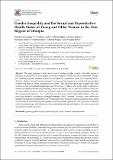| dc.contributor.author | Dessalegn, Muluken | |
| dc.contributor.author | Ayele, Mhiret | |
| dc.contributor.author | Hailu, Yeshitila | |
| dc.contributor.author | Addisu, Genetu | |
| dc.contributor.author | Abebe, Sintayehu | |
| dc.contributor.author | Mogess, Geteneh | |
| dc.contributor.author | Stulz, Virginia | |
| dc.contributor.author | Haset, Solomon | |
| dc.date.accessioned | 2022-01-26T13:16:24Z | |
| dc.date.available | 2022-01-26T13:16:24Z | |
| dc.date.issued | 2020-06-26 | |
| dc.identifier.citation | Dessalegn, M., Ayele, M., Hailu, Y., Addisu, G., Abebe, S., Solomon, H., Mogess, G., & Stulz, V. (2020). Gender Inequality and the Sexual and Reproductive Health Status of Young and Older Women in the Afar Region of Ethiopia. International Journal of Environmental Research and Public Health, 17. | en_US |
| dc.identifier.other | doi:10.3390/ijerph17124592 | |
| dc.identifier.uri | https://repository.amref.ac.ke/handle/123456789/530 | |
| dc.description | © 2020 by the authors. Licensee MDPI, Basel, Switzerland. This article is an open access
article distributed under the terms and conditions of the Creative Commons Attribution
(CC BY) license (http://creativecommons.org/licenses/by/4.0/). | en_US |
| dc.description.abstract | The main purpose of this research was to analyze gender context in the Afar region of
Ethiopia and propose a set of strategies or actions to improve adolescent and youth health. Using a
pre-established gender analysis framework, an explorative qualitative study was conducted in five
districts. Sixteen key informants and eight focus group discussions were conducted among adult
women and men of young adolescents and youth. The study revealed that younger and older
women are the most disadvantaged groups of the society. This is due to the high workload on
women and girls (housekeeping, building a house and taking care of cattle and children), they also
are less valued, have no control over resources and have no part in decision making, including
their personal life choices. As a result, they rarely access school and health facilities. They are
forced get married according to arranged marriage called “absuma.” As such, they su er from
multiple reproductive health problems. Women have poor decision-making autonomy, lack control
over resources, have limited participation in socio-economic practices, and experience child and
early forced marriage, and this poor service utilization has exposed them to the worst sexual and
reproductive health outcomes. | en_US |
| dc.publisher | MDPI | en_US |
| dc.subject | Gender | en_US |
| dc.subject | Gender analysis | en_US |
| dc.subject | Gender equity | en_US |
| dc.subject | Value | en_US |
| dc.subject | Absuma | en_US |
| dc.subject | Empowerment | en_US |
| dc.title | Gender Inequality and the Sexual and Reproductive Health Status of Young and Older Women in the Afar Region of Ethiopia | en_US |
| dc.type | Article, Journal | en_US |

